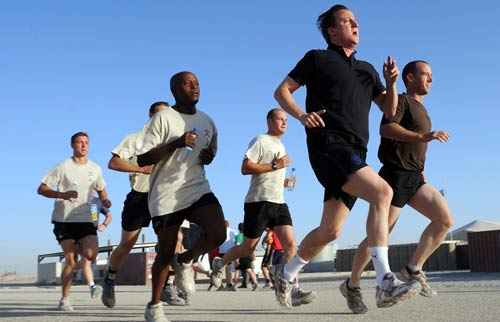World
UK's Cameron says troops will leave once Afghans ready
(Agencies)
Updated: 2010-06-12 12:38
 |
Large Medium Small |
 |
|
Britain's Prime Minister David Cameron (2nd R) jogs with British forces at Camp Bastion in Helmand Province, Afghanistan June 11, 2010. [Agencies] |
CAMP BASTION - British Prime Minister David Cameron told troops on Friday they were not in Afghanistan for a "dreamy idea" or to build a model society, and pledged they would leave once Afghans could defend themselves.
Wrapping up his first trip as prime minister to meet British troops in southern Afghanistan, Cameron said the new coalition he heads had a clear mission -- defending Britain's national security from the threat of attack by al Qaeda.
He pledged to give the 9,500 British troops serving in Afghanistan, who have taken part in some of the fiercest fighting against Taliban insurgents, the equipment they needed.
Cameron, who formed a coalition of centre-right Conservatives and centre-left Liberals after the May 6 election, said the operational allowance soldiers receive while on active service in Afghanistan would be doubled.
The moves addressed the main criticisms Cameron had of the previous Labour government -- that it had failed to give British soldiers the right equipment to protect them from deadly roadside bombs and had failed to explain clearly to British people why the troops needed to be in Afghanistan.
"We are not here to build the perfect democracy. We are not here to build some perfect model society. We are here to help the Afghans take control of their security so we can go home," Cameron told about 400 British troops gathered on a dusty, sandstorm-swept parade ground at Camp Bastion base in southern Afghanistan.
"I can sum up this mission in two words: It is about national security, our national security in the UK ... We don't have some dreamy ideas about what this mission is about," Cameron said. "Just as soon as we have trained up that Afghan security we can go home with our heads held high."
He told the troops it was a war of necessity, not of choice. If the British left tomorrow, al Qaeda training camps would come back to Afghanistan, because the Afghans were not yet ready to look after their own security, he said.
Britain has the second-largest foreign contingent in Afghanistan, still small compared to the 100,000 U.S. troops, but support for the mission is waning at home.



